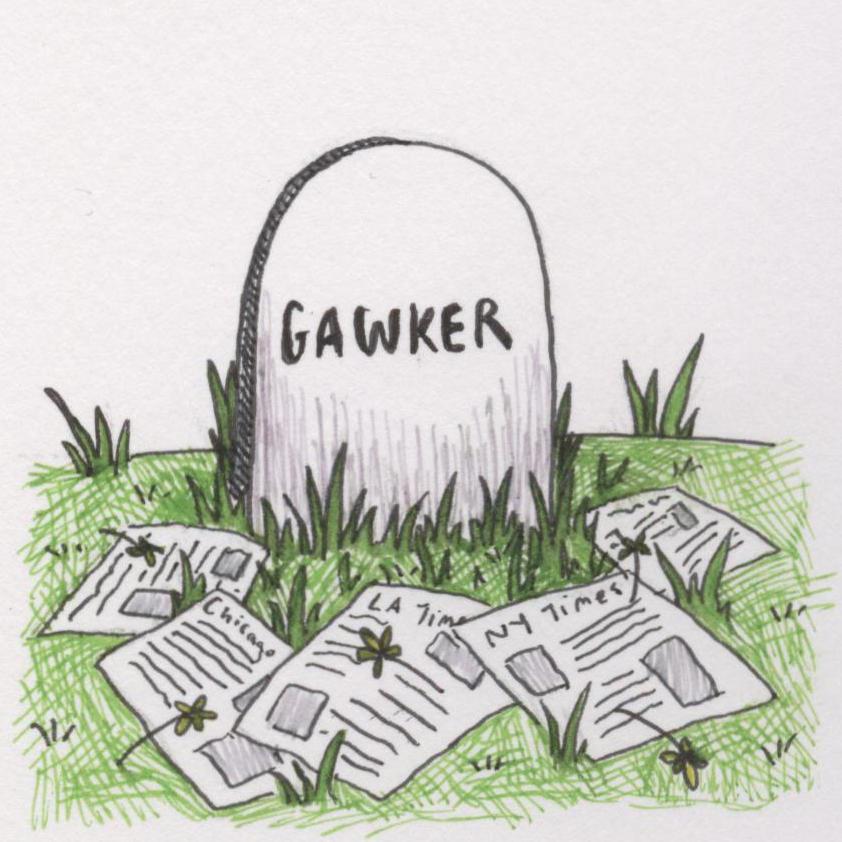Following its closure last Monday, Gawker seems to have about as many friends in death as it did in life — close to zero.
After publishing a clip from Terry Bollea’s — also know as Hulk Hogan’s — sex tape with his friend’s wife, Gawker became embroiled in the lawsuit that would eventually kill the online news media outlet.
There have been a few short editorials lamenting the situation and a handful of places compiled favorites from the site’s history. But all in all, the world has moved on, as if a company that made $45 million in 2014 while publishing some of the country’s most controversial gossip simply vanished. In the process, the mainstream media has shown itself to be just as hypocritical as Gawker always claimed.
Hogan sued with the secret financial backing of billionaire venture capitalist Peter Thiel, who Gawker outed as gay in a 2007 article criticizing the heteronormativity of Silicon Valley.
Gawker Media — the company of which Gawker.com was the flagship — lost, declared bankruptcy and went up for auction, unable to generate the case’s $140 million payout. Univision purchased Gawker’s assets Aug. 16, with a $135 million bid and promptly announced Gawker.com would cease operations while the company absorbs Gawker Media’s other sites, which include video game outlet Kotaku, feminist publication Jezebel and sports gossip site Deadspin.
There are a lot of ethical issues to unpack here, but set most of them aside. Set aside whether Theil’s anger at being outed by the website gives him sufficient claim for vengeance. Set aside the questionable balance of a legal system that allows a wealthy man to fund a slightly less wealthy man’s vendetta. Even set aside the question of whether Hogan’s video — or Theil’s sexuality — should have come out as news in the first place.
No, the true concern here is two wealthy people were able to destroy a media outlet because they disliked the coverage they received. That should bother the media world, seeing as the distribution of information people hope to hide is a large chunk of its job. This is a freedom of speech issue through and through. Yet most of the media has remained quiet about Gawker’s demise.
In every way but the public response, Gawker’s closure is reminiscent of when Grantland — a sports blogging site operated under ESPN and lead by popular sports blogger Bill Simmons — ceased operations. During a very public breakup between Simmons and the sports broadcasting giant, Grantland was caught in the crossfire, and ESPN shuttered the site October 2015.
Cue the eulogies as think pieces flooded the internet from all angles. Like Gawker, the loss of Grantland was less than shocking. Without Simmons to lead it and a focus on long-form pieces about topics often far-removed from sports, the property’s value was unclear to ESPN. Still, The Washington Post ran a gushing article headlined “Why Grantland mattered to journalism,” and seemingly every post about the closure included the word “beloved.”
My question is pretty straightforward: What makes Gawker any less deserving of an industry-wide farewell?
Grantland mostly consisted of extensive pieces that, despite their presentation, were essentially blog posts. Many included little-to-no hard reporting, relying primarily on introspective reflections about the effect of sports and pop culture on people’s lives. Still, it wasn’t un-truthful, and after all, truth is an important part of journalism.
Gawker, for all its faults, didn’t post things it couldn’t prove. It said it had a video of Hogan having sex with his friend Bubba The Love Sponge Clem’s wife, so it posted a two-minute clip of it. It alleged Rob Ford, former Toronto mayor, was on video smoking crack, and you can view that very incident. It said a married Conde Nast executive was hiring a male escort, and it had the facts to back the assertion.
While the Hogan case was what ultimately killed Gawker, the Conde Nast incident was what turned much of the public against it. Controversy around the story lead to a massive staff conflict within Gawker, a policy shift and countless accusations of irresponsibility.
But remember that time in 2014 when Grantland ran an article that was supposed to be about golf clubs and instead used it to out a transgender woman named Essay Anne Vanderbilt? She killed herself. Grantland was rightfully criticized for its actions, and it apologized for running the story.
And that was that. Everyone went right back to loving Grantland, while few have forgiven Gawker.
The same thing happened with The Daily Beast’s Olympics coverage earlier this month, which managed to mock, mislead and potentially out gay athletes with an article about using Grindr in the Olympic village. People complained for about a week, then everyone stopped shouting.
Why is Gawker less deserving of forgiveness in its worst moment? It announced a change in editorial direction, which it did a fine job of fulfilling until its closure. Over the last year, there has been a clear attempt to step away from offensive trash, but all people point to is the Conde Nast incident.
The argument might be that Gawker has published that sort of bile for longer, so it is less deserving of mourning — the outlet almost had it coming. To others, there’s no “almost” about it.
But I’d like to remind those people that nobody has died because of Gawker’s work. Meeting that metric doesn’t make Gawker an innocent organization, but let’s not pretend it was categorically less worthy of existing than every other outlet — the “beloved” Grantland included — that makes reckless editorial choices.
You can write Gawker off as trashy gossip, or you could hold it up as an influential platform that pushed boundaries further than just about anywhere else. There is sufficient evidence for both of these things to be true. But regardless of which side you take, you can’t deny that a one-of-a-kind, relentless advocate for public information is gone.
Gawker spent its time keeping business, political and media executives at the ready, happily mocking them when they faltered in any way. Say what you will about its methods — that’s a job few have done better.
Gawker is gone. Nobody can change that, and maybe nobody should.
Still, we could’ve at least said goodbye.
Matt Moret is the Assistant Opinions Editor for The Pitt News. He primarily writes about politics and rhetoric.
Write to Matt at [email protected]



